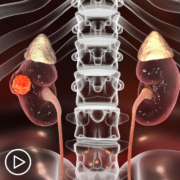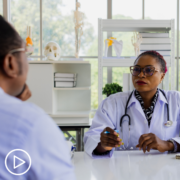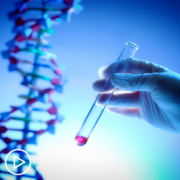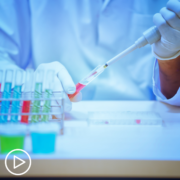A Renowned Expert Weighs in on the Future of Renal Medullary Carcinoma
A Renowned Expert Weighs in on the Future of Renal Medullary Carcinoma from Patient Empowerment Network on Vimeo.
What does the future of renal medullary carcinoma (RMC) care look like? Expert Dr. Nizar Tannir shares his perspective on the progression of RMC care, issues that still need advocacy, and his hopes for the future.
Dr. Nizar Tannir is a Professor in the Department of Genitourinary Medical Oncology, Division of Cancer Medicine at The University of Texas MD Anderson Cancer Center.
[ACT]IVATION TIP
“So, my hope and my plea is for all of us to work together to realize this dream that I hope I will see before I die and before I retire, that RMC deserves the support, not only RMC, but all aggressive, rare tumors require and deserve the support from funding and equal healthcare access.”
Download Guide | Descargar Guía
Related Resources:

|

How Do You Explain RMC to Newly Diagnosed Patients and Families? |
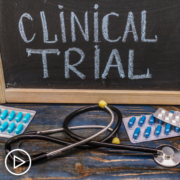
Why Renal Medullary Carcinoma Clinical Trial Participation Is Pivotal |
Transcript:
Cora:
Dr. Tannir, you’ve dedicated your life to patients like my brother Herman, and we are so grateful for your genius and that of your colleagues, what is your hope for the future of RMC?
Dr. Tannir:
Cora, it’s been a privilege, an honor to have been with Herman and you on his journey from April 2012 and today, April, we are in April 2023, 11 years. He came with stage IV, and it took several months trying to get to a place that will take his symptoms and his diagnosis, seriously, get to the bottom of it and initiate therapy urgently. I am so happy for the outcome that Herman has achieved with your support, I could not think of how he could have done it without you on his side. You have dedicated, in fact, I know you have three sons, you’ve raised three wonderful young men, but you had Herman always.
So my hope is Herman’s success story. Herman triumph over RMC, will not be just one singular story that we talk about, but that story, I hope will be the common story we will tell about other patients with RMC. It will require research. It will require funding for the research, it’ll require raising awareness. It’ll require working with our policy makers, our congress, members of Congress and administration to open the gates, remove the barriers for patients with RMC, who are in this country, who are U.S. citizens, to allow them the care that members of Congress get that I get and I can get at MD Anderson any time. I think it is important, it’s not just important to have the tools, the scientific tools, the research tools, but also if those tools, if those clinical trials are not made available to people with RMC who need it in every city and town in the United States, well, how good our tools are if they can be only offered to only a few.
So, my hope and my plea is for all of us to work together to realize this dream that I hope I will see before I die and before I retire, that RMC deserves the support, not only RMC, but all aggressive, rare tumors require and deserve the support from funding and equal healthcare access. We really need to remove those disparity barriers. But from the scientific research and medical standpoint, I really see that we have seen a sea of change over the past 10 years and more so over the past five, six years. We are confident that we can, we can with a red pen mark, cross that RMC I hope in the next few years.
I know we can do it, there has been, So much excitement about RMC, whereas 10 years ago when Herman was diagnosed, not too many people were excited or interested or knew about RMC and what to do, now many, I can say many investigators in the U.S. and in Europe and other places are interested. They’re doing research. They’re applying for grants on RMC. So I am optimistic, I am glad. I look back and I see that all that hard work, and I think Herman is a beacon, a bright light in this dark field that has been dark field RMC, that light that has shone it was shining, and you’re helping there to lead to improvement. I can tell you, Cora, that patients with RMC now have a much better chance of surviving many years compared to years ago when they only had a few months to live. Now people are living two, three, four, five, and seven years, and 10 years and longer. So progress has been made, but there is more…more progress to achieve towards the cure.
I am confident that we will conquer RMC in the future. It takes a village. It takes the world to do it, and I am happy to see that we have made that progress. So thank you for all the support you provided to all those patients. Not just your brother, but all these people who contacted you to get guidance and wisdom from you and for sending many of those my way and to MD Anderson. So it’s my privilege and honor to have been at MD Anderson in this field to be able to have helped your brother and help other patients with RMC together, we will do it, we will conquer RMC.
Share Your Feedback:
Create your own user feedback survey

